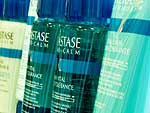| Home A B C D E F G H I J K L M N O P Q R S T U V W X Y Z |
|
Home |
Dandruff Treatment and RemediesIntroduction Dandruff is a very common form of scalp irritation. It is actually a disease in itself, says Dr. Warwick Carter in his book The Complete Family Medical Guide, but most people describe a scalp that is shedding copious quantities of skin scale as dandruff. Dandruff is characterized by accelerated cell turnover — in other words, the cells on the surface of your skin build up like crazy. “Typically, it takes 21 days for new cells to migrate to the surface of your scalp, where they are shed, says Dr. Yohini Appa, director of product efficacy at the Neutrogena Corporation. “Ideally, it’s an invisible process. But with dandruff, the cell reaches the surface in half the time.” As a result, cells build up on your scalp in clumps before they’re shed. And when they shed, they look like tiny white flakes. Below are some treatments and remedies to control if not cure dandruff: Choose an anti-dandruff shampoo that contains coal tar, salicylic acid, pyrithione zinc, sulfur or selenium sulfide, says Dr. Patricia Farris Walters. 
Each ingredient reduces dandruff in a different way. The tar-based shampoos slow cell production, while salicylic acid-based shampoos slough off dead cells before they clump. And both shampoos have anti-fungal properties and help fight invading yeast microbes, which is one of dandruff’s most persistent triggers. Pyrithione zinc and selenium sulfide reduce cell turnover, while sulfur is believed to cause slight skin irritation — just enough to lead to the shedding of flakes. Some shampoos on the market contain more than one ingredient, says Dr. Walters. Trial and error is the only way to sort out which one will work for you. When you wash your hair, lather once, rinse, lather a second time and really rub your scalp as you shampoo. Let the shampoo sit on your head for at least five minutes, and rinse well. Self-help: Yogurt is recommended as a hair conditioner. Wash and rinse the hair, then rub yogurt into the scalp, and leave for 10-15 minutes. Rinse, then wash again, using as little shampoo as necessary. An infusion of thyme, nettle or sage with 2 tablespoons of vinegar can be used as a final rinse. (To make an infusion, fresh or dried herbs can be used in loose or tea-bag form. Warm a teapot and put in 1 dessertspoon of herb for each cup required. Pour in a cup of boiling water for each cup of tea; allow to steep for 10-15 minutes.) Consultation: A practitioner will tell you that dandruff may indicate poisons in the system or nutritional deficiencies and imbalances in levels of minerals and/or trace elements. He will recommend a diet of plenty of fresh fruit and vegetables, whole grains and wheat germ, vegetable oils and high-protein food, such as lean meat and nuts. To be avoided are: sugar and starch products, alcohol, and fatty or highly spiced foods. There are a number of specific homeopathic remedies available to treat dandruff, and many of them are very effective. Experimentation with the following remedies may provide the solution, or seek a homeopath’s advice: Arsenicum, sepia, sulfur, mezereum, fluoric ac., graphites, oleander and nartrum mur. A South African herbal treatment for dandruff is a paste made by mixing borax with an infusion in boiling water of the fresh roots of the wild scabious (or ‘pincushion’), a common veld flower in midsummer. Rub the paste into the scalp once a week. For a scalp massage after shampooing, use infusions of rosemary or lavender. Mix essential oils of cedarwood (seven drops) cypress and juniper (each ten drops) in 50ml of carrier oil. Rub well into the scalp and leave for one hour. To remove, rub neat, mild shampoo into the hair, then wash out with warm water. To keep dandruff at bay, use the same quantities of the oils in 600ml of warm water. Stir well and use as a final rinse. A kinesiologist may suggest tea tree oil, hair and scalp care, selenium shampoo and vitamin A to be taken orally. |
||
|
|
||
|
Glossary References Links Contact
|